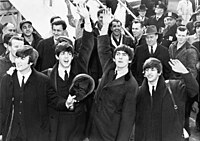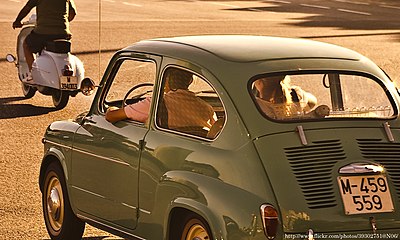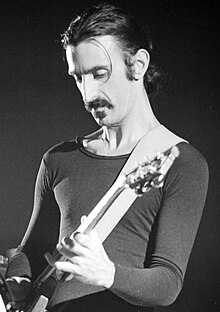Portal:1960s
The 1960s Portal
The 1960s became synonymous with the new, radical, and subversive events and trends of the period. In Africa the 1960s was a period of radical political change as 32 countries gained independence from their European colonial rulers. Some commentators have seen in this era a classical Jungian nightmare cycle, where a rigid culture, unable to contain the demands for greater individual freedom, broke free of the social constraints of the previous age through extreme deviation from the norm. Christopher Booker charts the rise, success, fall/nightmare and explosion in the London scene of the 1960s. However, this alone does not explain the mass nature of the phenomenon. Several nations such as the U.S., France, Germany and Britain turned to the left in the early and mid 1960s. In the United States, John F. Kennedy, a Keynesian and staunch anti-communist, pushed for social reforms. His assassination in 1963 was a stunning shock. Liberal reforms were finally passed under Lyndon B. Johnson including civil rights for African Americans and healthcare for the elderly and the poor. Despite his large-scale Great Society programs, Johnson was increasingly reviled by the New Left at home and abroad. The heavy-handed American role in the Vietnam War outraged student protestors across the globe, as they found peasant rebellion typified by Ho Chi Minh and Che Guevara more appealing. Italy formed its first left-of-center government in March 1962 with a coalition of Christian Democrats, Social Democrats, and moderate Republicans. Socialists joined the ruling block in December 1963. In Britain, the Labour Party gained power in 1964. In Brazil, João Goulart became president after Jânio Quadros resigned. This is a Featured article, which represents some of the best content on English Wikipedia..
The September 1964 South Vietnamese coup attempt took place before dawn on September 13, 1964, when the ruling military junta of South Vietnam, led by General Nguyễn Khánh, was threatened by a coup attempt headed by Generals Lâm Văn Phát and Dương Văn Đức, who sent dissident units into the capital Saigon. They captured various key points and announced over national radio the overthrow of the incumbent regime. With the help of the Americans, Khánh was able to rally support and the coup collapsed the next morning without any casualties. In the month leading up to the coup, Khánh's leadership had become increasingly troubled. He had tried to augment his powers by declaring a state of emergency, but this only provoked large-scale protests and riots calling for an end to military rule, with Buddhist activists at the forefront. Fearful of losing power, Khánh began making concessions to the protesters and promised democracy in the near future. He also removed several military officials closely linked to the discriminatory Catholic rule of the slain former President Ngô Đình Diệm; this response to Buddhist pressure dismayed several Catholic officers, who made a few abortive moves to remove him from power. (Full article...) This is a Good article, an article that meets a core set of high editorial standards.
 The Judy Garland Show is an American musical variety television series that aired on CBS on Sunday nights during the 1963–1964 television season. Despite a sometimes stormy relationship with Judy Garland, CBS had found success with several television specials featuring the star. Garland, who for years had been reluctant to commit to a weekly series, saw the show as her best chance to pull herself out of severe financial difficulties. Despite it being cancelled relatively early on, it is now revered and considered an important piece of television history. Production difficulties beset the series almost from the beginning. The series had three different producers in the course of its 26 episodes and went through a number of other key personnel changes. With the change in producers also came changes to the show's format, which started as comedy and variety but switched to an almost purely concert format. (In fact, as of episode 20, the on-screen title of the show became Judy Garland In Concert.) (Full article...) Selected picture -Did you know -
Related portalsThis is a Featured article, which represents some of the best content on English Wikipedia..
Frank Vincent Zappa (/ˈzæpə/ ZAP-ə; December 21, 1940 – December 4, 1993) was an American musician, composer, and bandleader. In a career spanning more than 30 years, Zappa composed rock, pop, jazz, jazz fusion, orchestral and musique concrète works; he also produced almost all of the 60-plus albums that he released with his band the Mothers of Invention and as a solo artist. His work is characterized by nonconformity, improvisation sound experimentation, musical virtuosity and satire of American culture. Zappa also directed feature-length films and music videos, and designed album covers. He is considered one of the most innovative and stylistically diverse musicians of his generation. As a mostly self-taught composer and performer, Zappa had diverse musical influences that led him to create music that was sometimes difficult to categorize. While in his teens, he acquired a taste for 20th-century classical modernism, African-American rhythm and blues, and doo-wop music. He began writing classical music in high school, while simultaneously playing drums in rhythm and blues bands, later switching to electric guitar. His debut studio album with the Mothers of Invention, Freak Out! (1966), combined satirical but seemingly conventional rock and roll songs with extended sound collages. He continued this eclectic and experimental approach throughout his career. (Full article...) This is a Good article, an article that meets a core set of high editorial standards.
Leonid Ilyich Brezhnev (19 December 1906 – 10 November 1982) was a Soviet politician who served as General Secretary of the Communist Party of the Soviet Union from 1964 until his death in 1982, and Chairman of the Presidium of the Supreme Soviet (head of state) from 1960 to 1964 and again from 1977 to 1982. His 18-year term as General Secretary was second only to Joseph Stalin's in duration. Brezhnev was born to a working-class family in Kamenskoye (now Kamianske, Ukraine) within the Yekaterinoslav Governorate of the Russian Empire. After the results of the October Revolution were finalized with the creation of the Soviet Union, Brezhnev joined the Communist party's youth league in 1923 before becoming an official party member in 1929. When Nazi Germany invaded the Soviet Union in June 1941, he joined the Red Army as a commissar and rose rapidly through the ranks to become a major general during World War II. Following the war's end, Brezhnev was promoted to the party's Central Committee in 1952 and became a full member of the Politburo by 1957. In 1964, he consolidated enough power to replace Nikita Khrushchev as First Secretary of the CPSU, the most powerful position in the country. (Full article...) Selected article -The Mexican Movement of 1968, also known as the Mexican Student Movement (Movimiento Estudiantil) was a social movement composed of a broad coalition of students from Mexico's leading universities that garnered widespread public support for political change in Mexico. A major factor in its emergence publicly was the Mexican government's lavish spending to build Olympic facilities for the 1968 Olympics in Mexico City. The movement demanded greater political freedoms and an end to the authoritarianism of the PRI regime, which had been in power since 1929. Student mobilization on the campuses of the National Autonomous University of Mexico, National Polytechnic Institute, El Colegio de México, Chapingo Autonomous University, Ibero-American University, Universidad La Salle and Meritorious Autonomous University of Puebla, among others created the National Strike Council. Its efforts to mobilize Mexican people for broad changes in national life was supported by many sectors of Mexican civil society, including workers, peasants, housewives, merchants, intellectuals, artists, and teachers. (Full article...) More Did you know (auto generated)
TopicsCategoriesWikiProjects
Associated WikimediaThe following Wikimedia Foundation sister projects provide more on this subject:
Discover Wikipedia using portals |






























